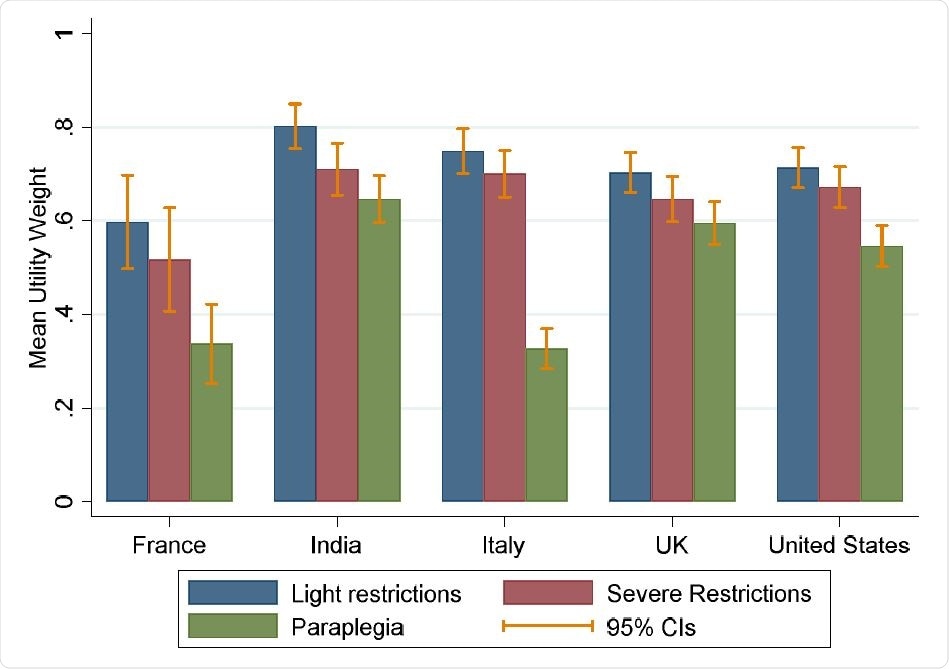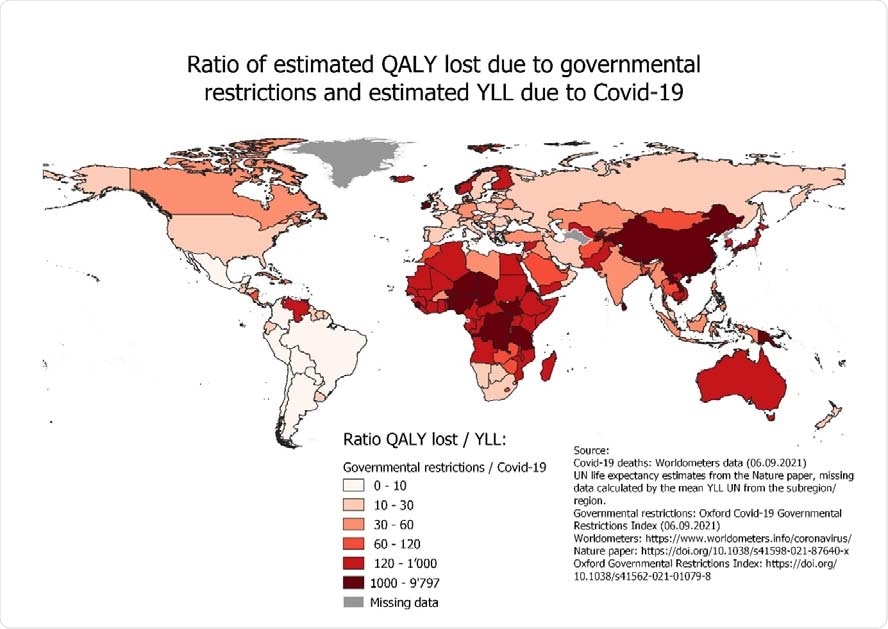Besides the unprecedented social, economic, and health systems disruptions, the coronavirus disease 2019 (COVID-19) pandemic has incurred a loss of an estimated 20.5 million life years. In addition, the pandemic has imposed a significant public health burden impacting individuals' quality of life and mental health.

 This news article was a review of a preliminary scientific report that had not undergone peer-review at the time of publication. Since its initial publication, the scientific report has now been peer reviewed and accepted for publication in a Scientific Journal. Links to the preliminary and peer-reviewed reports are available in the Sources section at the bottom of this article. View Sources
This news article was a review of a preliminary scientific report that had not undergone peer-review at the time of publication. Since its initial publication, the scientific report has now been peer reviewed and accepted for publication in a Scientific Journal. Links to the preliminary and peer-reviewed reports are available in the Sources section at the bottom of this article. View Sources
Participants were asked to complete a series of time trade-off questions related to living with light restrictions – masks, restricted access to restaurants and restricted international travel, and severe restrictions – light restrictions plus home office, home-schooling and restrictions to private gatherings. Respondents were also asked to specify the relative utility of life with paraplegia—as a commonly used reference point.

Mean utility weights for light restrictions, severe restrictions and paraplegia. Light restrictions: wearing masks in public spaces, restricted access to bars and restaurants, limited international travel. Severe restrictions: wearing masks in public spaces, restricted access to bars and restaurants, limited international travel. Mandatory home office, remote schooling and the inability to hold private meetings.
The results depicted that the average estimated utility was 0.71% for light restrictions, 0.65 for severe restrictions, and 0.49% for paraplegia. Quality-adjusted life years (QALY) utility weights were relatively similar across countries. Meanwhile, the lowest average utility weights were found in France, and the highest weights on average in India.
Globally, a total loss of 2,980 million QALYs has been estimated until now due to government-imposed light or severe restrictions as of September 6, 2021. The highest absolute burden was concentrated in upper and lower-middle-income countries, owing to the large populations along with the longer average duration of restrictions.

Ratio of QALYs lost due to Covid-19 Restrictions to YLL due to Covid-19
Additionally, a discrete choice experiment (DCE) was conducted to quantify the respondents' willingness to pay (WTP) to avoid specific restrictions. Random utility models were utilized to estimate (implicit) valuations of each restriction.
The results revealed that subjects were willing to part with 22% of their annual salary to avoid school and daycare closures and 21.8% of their annual salary to avoid closures of restaurants, bars, and clubs. The lowest WTP was observed for removing travel restrictions (7%) and wearing masks in public (2%).
Discussion
Despite progress in the COVID-19 vaccination drive, non-pharmaceutical interventions remain a key and even the primary management strategy in many low-income countries for controlling the spread of this virus.
The findings of this survey showed that the societal burden of non-pharmaceutical measures accounts for nearly three billion QALYs as of September 6, 2021—which corresponds to 38 times the estimated number of life-years lost due to the pandemic to date.
The societal costs of any restrictive measures taken by governments may be more significant than reported. Most citizens would be willing to lose a substantial fraction of their incomes to avoid several of these measures in the future.
Some measures were identified as minor burdens, for instance – wearing masks in public spaces or restrictions on international travels by most participants, yet they effectively reduced disease transmission. However, individual and social losses due to other measures, such as closing schools, bars, and restaurants, were deemed substantial.
Questions were framed in different ways, such as utility of these restrictions with COVID-19 and outside of COVID. Surprisingly, very similar responses are obtained with both types of framing, probably because often subjects justified these measures as necessary and assigned lower disutility. This was likely as they could not expect such restrictions sans COVID.
Another concern was that the respondents might not be able to quantify the relative utility of life with restrictions precisely. Nevertheless, the magnitudes reported here—about a quarter of life quality lost due to light restrictions and about a third due to severe restrictions—were deemed reasonable. Both mild- and severe restrictions were preferred to paraplegia. The average utility weight of 0.49 for paraplegia appeared to be well-aligned with estimates reported in the literature.
The present study was a novel attempt to quantify the societal impact of COVID-19 restrictions at national and global levels. The results underscore the high societal cost of non-pharmaceutical interventions used to prevent the spread of infectious diseases like COVID-19 in terms of the quality of life lost.

 This news article was a review of a preliminary scientific report that had not undergone peer-review at the time of publication. Since its initial publication, the scientific report has now been peer reviewed and accepted for publication in a Scientific Journal. Links to the preliminary and peer-reviewed reports are available in the Sources section at the bottom of this article. View Sources
This news article was a review of a preliminary scientific report that had not undergone peer-review at the time of publication. Since its initial publication, the scientific report has now been peer reviewed and accepted for publication in a Scientific Journal. Links to the preliminary and peer-reviewed reports are available in the Sources section at the bottom of this article. View Sources
Journal references:
- Preliminary scientific report.
Fink, G., Tediosi, F., & Felder, S. (2021). Global Burden of Covid-19 Restrictions: National, Regional and Global Estimates, medRxiv preprint, doi: 10.1101/2021.09.21.21263825, https://www.medrxiv.org/content/10.1101/2021.09.21.21263825v1
- Peer reviewed and published scientific report.
Fink, Günther, Fabrizio Tediosi, and Stefan Felder. 2022. “Burden of Covid-19 Restrictions: National, Regional and Global Estimates.” EClinicalMedicine 45 (March): 101305. https://doi.org/10.1016/j.eclinm.2022.101305. https://www.thelancet.com/journals/eclinm/article/PIIS2589-5370(22)00035-9/fulltext.